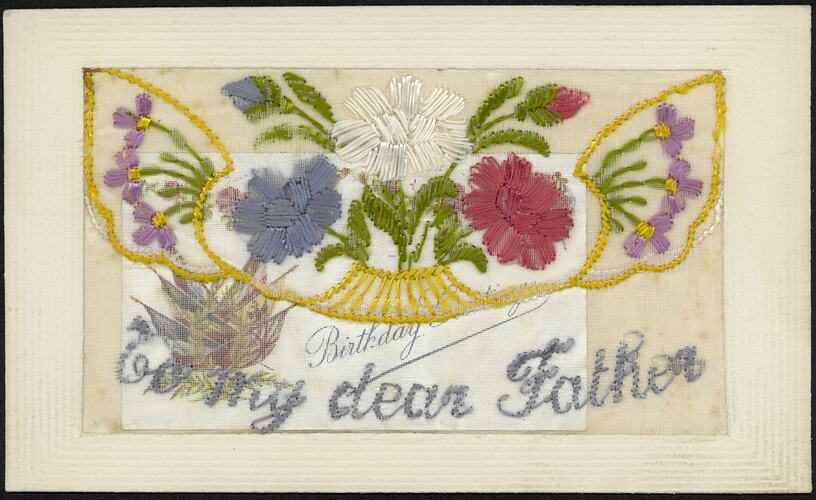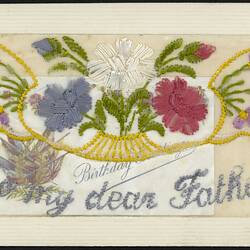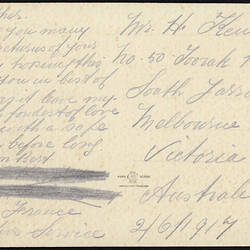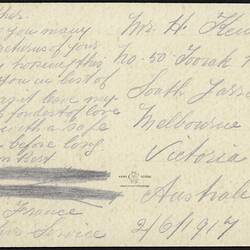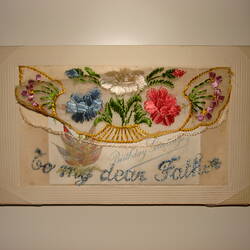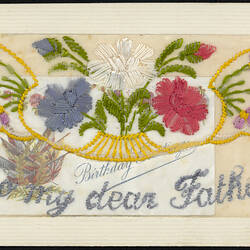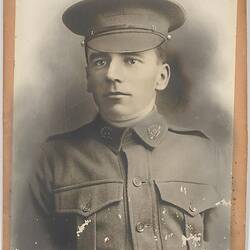Summary
Alternative Name(s): Birthday Card
Embroidered postcard, written by Private Albert Edward Kemp on the Western Front in 1917 during World War I, to his father.
He writes: 'Dear Father. Wishing you many happy returns of your birthday hoping this to find you in best of health as it leave myself with fondest of love to you with a safe return before long. Your son Bert'.
According to the Australian War memorial, 'Embroidered silk postcards were first made in 1900 for the Paris Exposition with popularity peaking during the First World War. A thriving cottage industry began around 1915 and the cards were generally embroidered on strips of silk mesh by French women in their own homes. There could be as many as 25 cards on these strips. Once completed, they were sent to factories for cutting and mounting on postcards. Production ceased around 1923 and an estimated 10,000,000 handmade postcards were produced from 1915 to 1919. Designs included Australian themes, greetings, flags, Christmas, units and camps.'
Albert Edward Kemp was a 32-year-old butcher living in Caulfield and married to Annie Josephine, when he enlisted. He and Annie had a daughter, Ethel Mavis, and a baby son, George Percival. Albert enlisted at Royal Park on 4 October 1916, and was assigned to the 22nd Reinforcements, 6th Battalion - regimental number 6800. His battalion left Melbourne 25 October 1916 - just 21 days after he enlisted. He was shipped to France on 27 March and was taken on strength on 4 April. On 21 September 1917, Albert died in the trenches in Glencorse Wood, Belgium. His body was never found. He is commemorated at 29 The Ypres (Menin Gate) Memorial, Belgium.
Physical Description
Embroidered postcard, consisting of a cardboard frame into which is set a piece of sheer embroidered fabric featuring brightly-coloured flowers and leaves, and and inscription. A flap in the fabric has allowed a separate card to be placed inside, with a separate inscription and image of patriotic flags.
More Information
-
Collection Names
-
Collecting Areas
-
Acquisition Information
Purchase from Mr Jeff Kemp, 07 Dec 2006
-
Addressed To
50 Toorak Road, South Yarra, Greater Melbourne, Victoria, Australia, 2 Jun 1917
-
Author
Private Albert E. Kemp - 6th Battalion, Australian Imperial Force (AIF), Europe
-
Format
Postcard, Colour
-
Inscriptions
Text, embroidered: 'To my dear Father.' On card within, printed in blue cursive script: 'Birthday Greetings'. Text, reverse: 'Dear Father/Wishing you many/happy returns of your/birthday hoping this/to find you in best of/health as it leave my-/self with fondest of love/to you with a safe/return before long. / Your son Bert / [two lines crossed out] / A.J.K. France / On Active Service'. Address on card: 'Mr H. Kemp / No. 50 .Toorak Road / South Yarra / Melbourne / Victoria / Australia / 2/6/1917'.
-
Classification
-
Category
-
Discipline
-
Type of item
-
Overall Dimensions
138 mm (Width), 84 mm (Height)
-
References
Information on silk postcards from [Link 1] accessed 4/4/08.
-
Keywords
Birthdays, Death & Mourning, Domestic Life, Wars & Conflicts, World War I, 1914-1918, Making History - Kemp Mourning Collection
